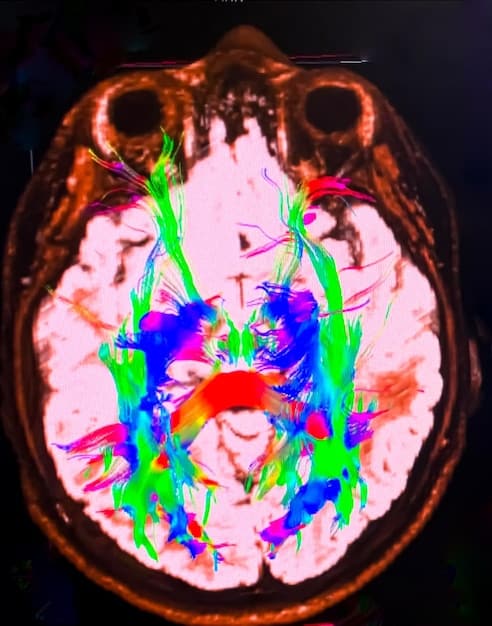Music Therapy for Mental Health: A Science-Backed Approach

Music therapy uses evidence-based musical interventions to address mental health needs, enhancing emotional expression, and improving cognitive and social skills.
Have you ever felt the calming effect of a melody or the uplifting power of a rhythm? How Does Music Therapy Impact Mental Health? A Science-Based Review and Practical Applications reveals the profound ways music can be harnessed to improve mental well-being, offering hope and healing through sound.
Understanding music therapy
Music therapy is an established healthcare profession that uses music interventions to accomplish individualized goals within a therapeutic relationship. But what exactly does this entail, and how does it deviate from simply listening to music?
Unlike passively enjoying music, music therapy involves active participation under the guidance of a trained therapist. This participation can take many forms, from singing and playing instruments to songwriting and music-assisted relaxation.

The goal is not necessarily to create beautiful music, but to use musical experiences to address emotional, cognitive, social, and physical needs. Let’s dive deeper into the methods and techniques used in this transformative therapy.
Methods and techniques in music therapy
Music therapy employs a variety of methods tailored to the client’s specific needs and goals. These techniques leverage the inherent qualities of music to facilitate healing and growth. Here are a few common approaches:
- Improvisation: Clients create music spontaneously, expressing thoughts and feelings without the need for formal musical training.
- Receptive music therapy: Clients listen to pre-recorded music or live music, followed by discussion or processing of their emotional and cognitive responses.
- Songwriting: Clients compose lyrics and melodies to express emotions, tell stories, or explore personal themes.
- Instrument playing: Clients engage with instruments to improve motor skills, coordination, and self-expression.
These methods are often combined and adapted to suit individual preferences and therapeutic objectives. The therapist’s role is to facilitate the musical experience and help clients make meaningful connections between their music and their lives.
In conclusion, music therapy is a dynamic and versatile approach to mental health care. By engaging clients in active musical experiences, therapists can help them unlock their potential for healing and growth.
The science behind music therapy and the brain
Music’s impact on the brain is profound and multifaceted. Neuroscientific research has revealed that listening to and creating music activates multiple brain regions, including those involved in emotion, memory, and motor control. Let’s explore how these neurological effects contribute to the therapeutic benefits of music therapy.
Functional magnetic resonance imaging (fMRI) studies have shown that music activates the amygdala, the brain’s emotional center, which can help process and regulate emotions. Music also stimulates the release of neurotransmitters such as dopamine and serotonin, which are associated with pleasure, well-being, and mood regulation.
Neurological effects of music
The neurological effects of music extend beyond emotional processing. Here are some key findings from neuroscience research:
- Enhanced neuroplasticity: Music can promote the brain’s ability to reorganize itself by forming new neural connections.
- Improved cognitive function: Music training and therapy can enhance memory, attention, and executive functions.
- Stress reduction: Music has been shown to decrease cortisol levels, a hormone associated with stress.
These neurological changes can have significant implications for mental health. Music therapy may help individuals recover from trauma, manage anxiety and depression, and improve overall cognitive function.

In summary, music therapy’s effectiveness is rooted in its ability to stimulate and modulate brain activity. By understanding these neurological mechanisms, therapists can better tailor interventions to meet the specific needs of their clients.
Music therapy for mood disorders: Depression and anxiety
Mood disorders like depression and anxiety can significantly impact daily life, but music therapy offers a promising complementary approach for managing these conditions. How does music therapy alleviate symptoms of depression and anxiety?
For individuals with depression, music therapy can provide a means of emotional expression and a sense of accomplishment. Engaging in music-making, whether through singing, playing instruments, or songwriting, can boost self-esteem and reduce feelings of hopelessness.
How music therapy helps with depression and anxiety
Music therapy can be effective for managing depression and anxiety in several ways:
- Emotional release: Music provides a safe and non-threatening way to express difficult emotions.
- Cognitive restructuring: Music therapy can help individuals challenge negative thought patterns and develop more positive self-perceptions.
- Relaxation: Music-assisted relaxation techniques can reduce physiological arousal and promote feelings of calm.
Studies have shown that music therapy can reduce symptoms of depression and anxiety, improve mood, and enhance overall quality of life. It’s a gentle yet powerful way to address the emotional challenges associated with these disorders.
To conclude, music therapy offers a valuable tool for managing mood disorders. By providing a safe and engaging medium for emotional expression and cognitive restructuring, it can improve the well-being of individuals struggling with depression and anxiety.
Music therapy for trauma and PTSD
Trauma and post-traumatic stress disorder (PTSD) can leave deep emotional scars, but music therapy offers a pathway to healing and recovery. How can music help individuals process and integrate traumatic experiences?
For survivors of trauma, music therapy can provide a non-verbal means of expressing emotions that may be difficult to articulate. Through improvisation, songwriting, and other musical techniques, clients can explore their experiences in a safe and supportive environment.
Benefits of music therapy for trauma survivors
Music therapy offers several benefits for individuals recovering from trauma:
- Emotional regulation: Music can help individuals manage intense emotions such as anger, fear, and sadness.
- Memory retrieval: Music can evoke memories and facilitate the processing of traumatic experiences.
- Self-empowerment: Music-making can restore a sense of control and agency in individuals who have experienced trauma.
Research suggests that music therapy can reduce symptoms of PTSD, improve emotional functioning, and enhance overall psychological well-being. It’s a powerful tool for reclaiming one’s life after trauma.
In summary, music therapy offers a valuable approach for addressing trauma and PTSD. By providing a safe and creative outlet for emotional expression and memory processing, it can empower individuals to heal and move forward.
Music therapy for autism spectrum disorder (ASD)
Autism spectrum disorder (ASD) is characterized by challenges in social communication and interaction, but music therapy can offer unique opportunities for connection and growth. How does music therapy benefit individuals with ASD?
For children and adults with ASD, music therapy can improve social skills, communication, and emotional regulation. Engaging in musical activities, such as singing, playing instruments, or participating in group music-making, can foster social interaction and enhance expressive abilities.
How music therapy aids individuals with ASD
Music therapy helps individuals with ASD in the following ways:
- Social interaction: Music provides a structured and predictable context for social interaction.
- Communication: Music can enhance verbal and non-verbal communication skills.
- Emotional expression: Music offers a way for individuals with ASD to express emotions that may be difficult to verbalize.
Studies have shown that music therapy can improve social communication, reduce anxiety, and enhance overall quality of life for individuals with ASD. It’s a versatile and engaging approach that can be tailored to individual needs and preferences.
In conclusion, music therapy offers significant benefits for individuals with ASD. By fostering social interaction, communication, and emotional expression, it can improve their well-being and enhance their quality of life.
Practical applications of music therapy
Music therapy is not confined to clinical settings; it can be incorporated into everyday life to promote mental well-being. How can you harness the power of music in your daily routine?
One simple way to incorporate music into your life is to create a playlist of songs that evoke positive emotions. Listening to upbeat music can boost your mood and energy levels, while calming music can reduce stress and promote relaxation.
Integrating music into daily life
Here are some practical ways to integrate music therapy techniques into your daily life:
- Mindful listening: Set aside time to listen to music without distractions, paying attention to your emotional and physical responses
- Singing: Sing along to your favorite songs to release tension and boost your mood.
- Instrument playing: Learn to play an instrument to enhance cognitive function and self-expression.
These simple practices can have a profound impact on your mental health. Music is a powerful tool that is accessible to all, regardless of musical background or ability.
In summary, there are countless ways to incorporate music therapy principles into your daily life. By mindfully engaging with music, you can enhance your emotional well-being and unlock your potential for healing and growth.
| Key Point | Brief Description |
|---|---|
| 🎵 Emotional Expression | Music helps in expressing feelings non-verbally. |
| 🧠 Brain Activation | Music stimulates different brain areas for mood regulation. |
| 🧘 Stress Reduction | Listening to music lowers cortisol levels, reducing stress. |
| 🗣️ Improved Communication | Music enhances communication skills, especially in ASD. |
Frequently Asked Questions
▼
Music therapy is the clinical and evidence-based use of music interventions to accomplish individualized goals within a therapeutic relationship by a credentialed professional.
▼
Music therapy helps with anxiety by reducing physiological arousal, promoting relaxation, and providing a means of emotional expression in a safe environment.
▼
Yes, music therapy can help with PTSD by facilitating the processing of traumatic memories, regulating emotions, and restoring a sense of control and empowerment.
▼
No, music therapy is not only for people with musical talent. It is accessible to all, regardless of musical ability or background, as it focuses on therapeutic outcomes rather than performance.
▼
You can find a qualified music therapist by searching the certification board for music therapists or consulting with healthcare professionals who can provide referrals.
Conclusion
In conclusion, music therapy is a powerful, science-backed approach to improving mental health. Its diverse applications, from managing mood disorders to aiding trauma recovery and enhancing communication in ASD, highlight its versatility and effectiveness. By understanding the neurological and emotional impacts of music, we can harness its potential to foster healing and enhance overall well-being.





